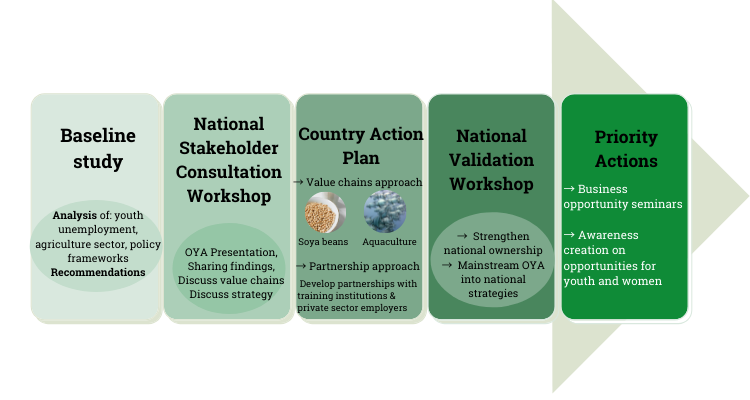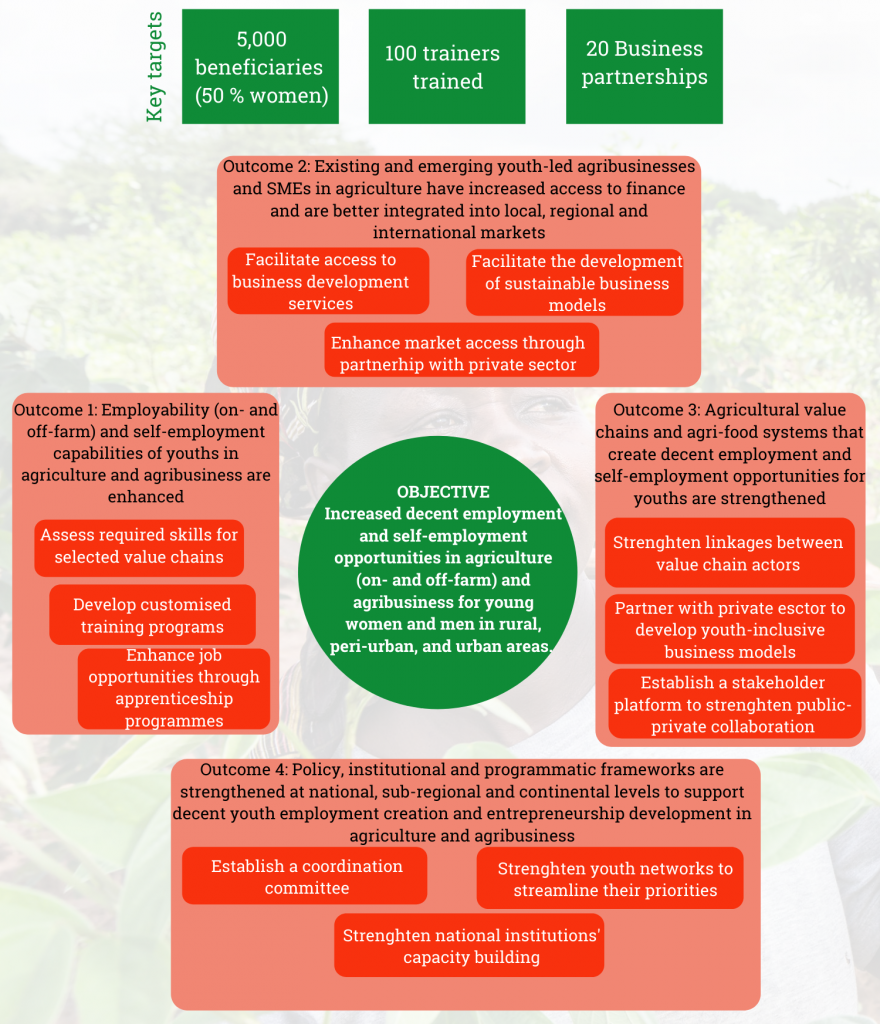National context
Zambia is one of the world’s youngest countries by median age. Unemployment is on the increase due to low education levels (only 58% of the population completed secondary education and 2% have an higher education) and professional training levels that do not match those expected from the private sector. Moreover, due to economic constraints, industries are not creating enough jobs compared to the population growth.
Youth involvement in agriculture has decreased from 56% in 2012 to 22% in 2019 since they perceive agriculture generates low income but requires intensive labour. Youths face several challenges: informal jobs, limited access to capital and finance, limited opportunities for and the quality of training, COVID-19 disruption against the labour market and limited policy supports.
Despite its challenges, agriculture sector shows high potential for youth employment. Strong urban demand for agri-foods, expensive imported food, excess processing capacity and digitalisation are the upward trends in the sector.
The COVID-19 pandemic has also negatively affected the demand side of agri-foods due to closure of restaurants, hotels and a ban on gatherings, workshops and tourism travel. The hotel industry which depends on the agri-foods sector virtually came to a standstill leading to the further loss of jobs in downstream support services such as the agri-food supply chains. In addition, COVID-19 required many youths to be familiar with digital technologies and access internet for e-Education, e-Training as most schools and TVET institutions closed over a long period of time.

Zambia Country Action Plan (CAP)
OYA baseline analysis has shown that training youths for them to be absorbed by industry or public is not enough to create the much-needed jobs for the youths in Zambia due to its stagnant economy. There is need, therefore, to shift focus towards job creation for the youth. In fact, youths are not interested in labour intensive and low paying jobs in agriculture, especially those that are at production level but prefer jobs high up the value chains such as those in agro-processing or business development service sector. Generally, there is a lack of value addition in most value chains in Zambia. This area is underdeveloped and if properly supported can offer good employment opportunities, especially among the rural youths so that they can supply the unmet high demand of agri-foods in the urban areas. Besides, farming enterprises are underdeveloped as well because of limited application of mechanization and market linkage.

CAP Key outcomes
OYA works in partnership with the government, youth associations, service providers, value chain actors, development partners, research institutions and academia, so as to adopt a comprehensive approach of youth employment in agriculture.
The programme also aims at mitigating the negative impacts of the COVID-19 crisis by (i) increasing quality of labour supply; (ii) increasing demand for labour through value chain development; (iii) enhancing entrepreneurial environment and (iv) policy development.
At the age of digitalization, and given the importance of developing ICT skills for youth and for the agriculture sector, OYA will focus on developing innovative tools to address primary issues in youth employment including; access to training programmes, finance, market, knowledge, skills and experiences and policy coordination.
Those innovative tools will also promote climate-smart interventions and good agricultural and agribusiness practices on environmental resource management.

Value Chains
Value chains were selected based on their potential in attracting youth and creating job opportunities. Potential value chains were analyzed to make sure they answer to the following criteria, critical to engage youth:
-
Small initial investment cost: Youths do not have money and find it hard to access finance.
-
Quick and high Return on Investment: Youths cannot wait for a long term to get income.
-
Growth potential and demand: Youths can sustainably capture local demand and create employment.
-
Sector support services: Youths need support services to compensate for their limitation such as finance, knowledge, inputs access.
-
High degree of innovation to maximise comparative advantage of youths in high adaptation nature to new technologies.
-
Resilience: Youths are vulnerable and do not have sufficient financial capacity to endure externally inevitable factors such as pest and disease, climate change.
Soybean and Aquaculture were selected as they were identified as value chains that are compatible and guarantee synergy. They have a strong value addition potential, through processing. With a high market demand, they could offer youth opportunities to generate income and maximize profit. In addition, both value chains are also a source of nutrition; enabling OYA programme to meet youth employment, food security and nutrition objectives, respectively.
